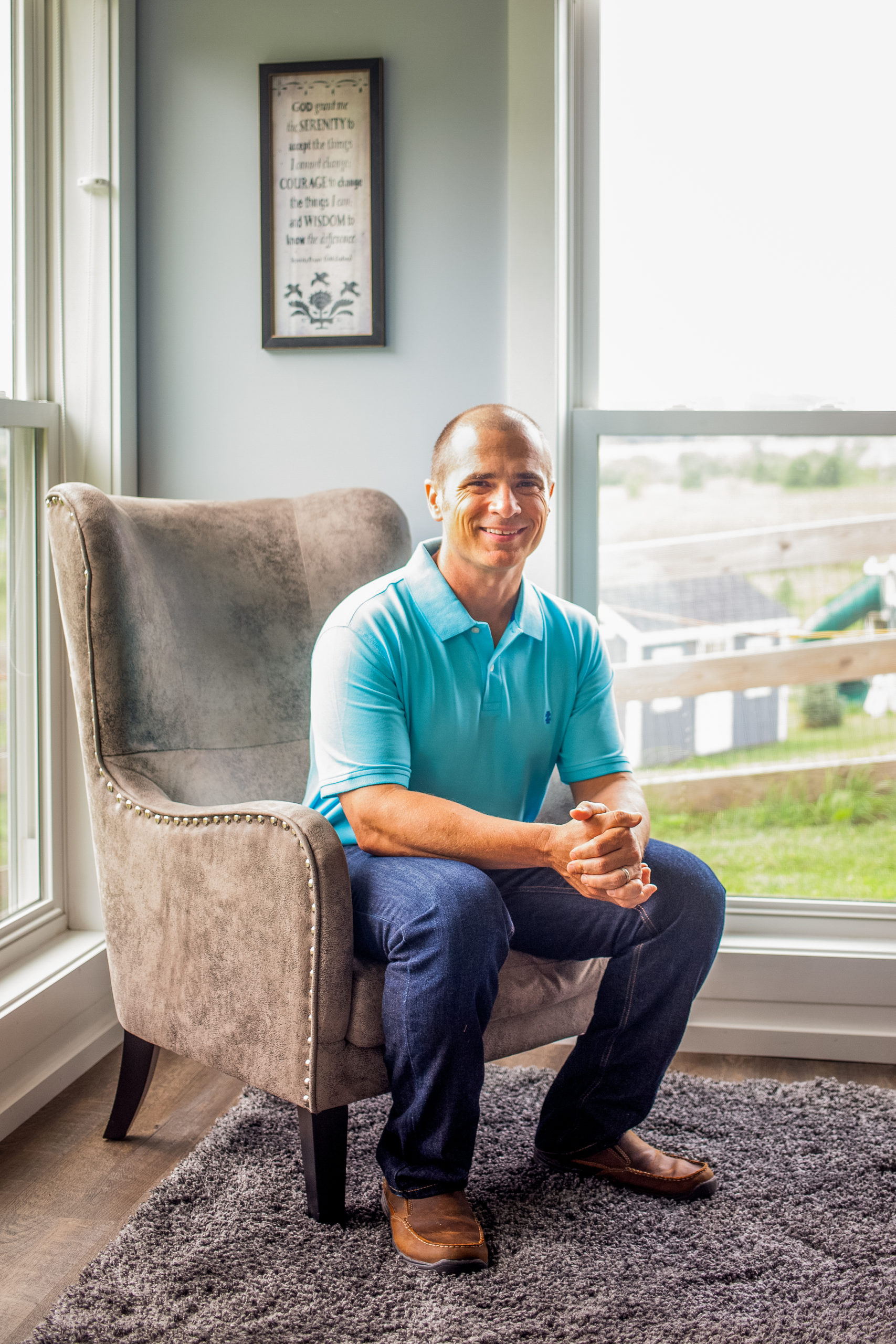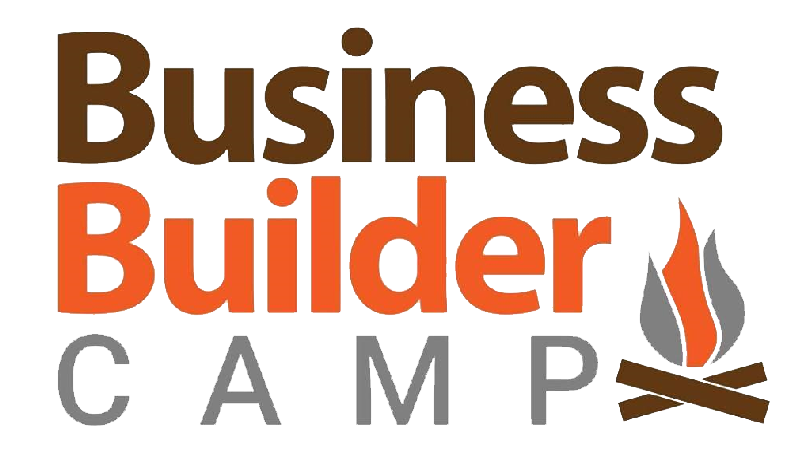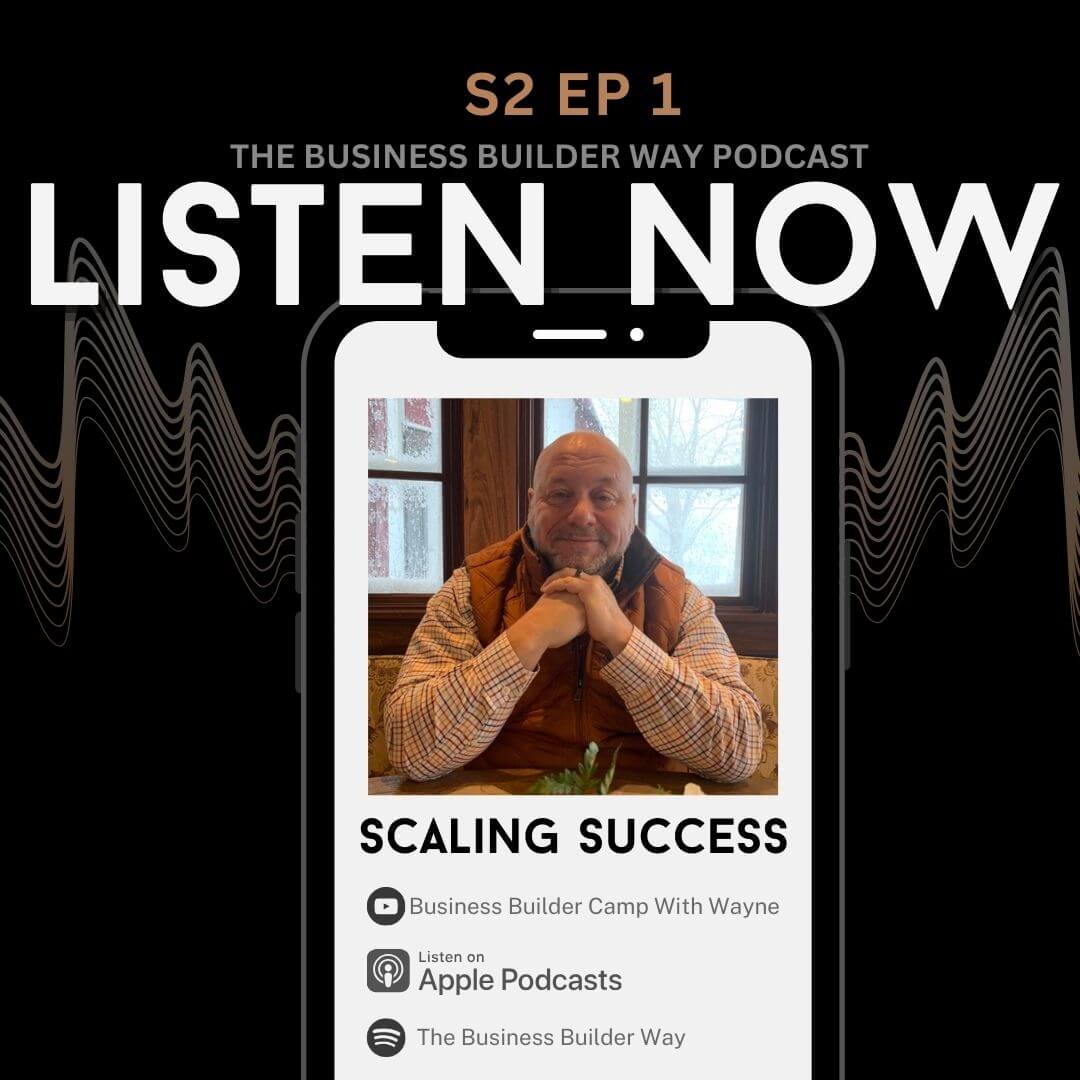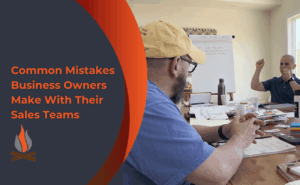Wayne Herring
00:00:0100:00:30
Welcome to the Business Builder Way podcast, where we help business builders grow leadership skills and wisdom and stay grounded through hero stories. So let's get after it. Hey, business builders. Good to be joined by Craig Leary today. Craig, thanks for coming and I'm just going to ask you this question that could be really simple or really deep, but we'll play with it. A who. Who are you and why are you here?
Craig Leary
00:00:3200:01:35
So who am I here? I came to business builder camp, frankly, out of desperation. I had a conversation with you, Wayne, some years ago over a cup of coffee and I was really excited to have gotten to meet you and stretched my comfort zone because I'm not quite the people person that you are. And about three years ago, my business was in a pretty desperate place, and I called you and you talked me off the ledge. And I started my journey at the business builder camp. And it's gone from, frankly, a lifeline to a place where I have immense trust and confidence in the people that are in my group. And they act as an advisory board or a board of directors or a confidant. And I also get a lot of pleasure in being able to provide value to them. And anybody who is in business is a better business person if you're sharing freely in whatever format that you do that. So that is why I'm here.
Wayne Herring
00:01:3700:01:44
Wonderful answer. Thank you. And I am glad that I drove down to the Harrisburg area and had that cup of coffee with you and.
Craig Leary
00:01:4400:01:45
That you said yes.
Wayne Herring
00:01:4500:02:23
And it was only later that I knew that that was out of your comfort zone. And I remember what sparked my interest in you was we met on social media and I really enjoyed how you talked about leadership and the care that I could feel coming through. Your posts about people and the joy you have as people grow and thrive and do well is what attracted me to you originally and that's carried through in the group and how you tell us stories about home pros. Of Central PA and the work you're doing there. And as you said, with how you enjoy pouring into other people within the group too.
Craig Leary
00:02:2400:02:58
Servant leadership has been something that I've sort of been passionate about or drawn to before I think there was even a term for it. And I have realized that it's a practice and it's easier to do when you're not part of a big company, but it's a hard thing to put people over numbers sometimes. So it's an ongoing practice, but I'm able to practice at a much higher level in my own business than I was when I was working with these big corporations.
Wayne Herring
00:02:5900:03:29
I'll circle back that people before numbers, but people that are joining business builders and getting to know everybody do like to know some of the kind of facts and logistics and who you are. So there's the deeper who you are, but then tell us a little bit about your business and the journey of buying that business and where you're at now and how many people and whatever comes to mind. But some of those things that are sort of like factoids are helpful.
Craig Leary
00:03:2900:05:08
Yeah, sure thing. So I have been kicking around the home remodeling home improvement industry for over 30 years and I've worked for some of the, frankly, the best companies in the country. And only recently did I realize I was getting burnt out. My last two assignments or roles, I didn't know until after that I was burnt out. But along that journey, I made a decision five years ago to open up my own business. I actually found a small company that had been in business about 30 years that I thought I could build off of and purchase that company. In fact, we just made the last payment on it, so it's officially ours. And in that time we went from a half a million to this year we're on pace to do eight and a half million in revenue. We went from one employee to 56 employees today. And we've built out a leadership team that I think is incredibly strong, that allows me to focus on my role as the visionary and to support them, but not necessarily do the work for them. And it's been quite a journey. And next year we'll hit the magic number of 10 million. And that's just a number, unless, you know that for us, it is what allows us to have the team that we have. So we knew that we were a little top heavy and we knew we had to build to a certain revenue number to justify the overhead costs. But we're finally going to realize that next year, so it's pretty exciting. Great.
Wayne Herring
00:05:0800:05:19
And what you do, the work that the company does, what does the company specifically do, how many employees, what kind of a location do you have trucks, things like that.
Craig Leary
00:05:2000:07:32
So when we started, we would do anything that was related to home improvement. Replacement windows, roofs, would build a birdhouse if you wanted us to build a birdhouse, a nice one. But we went through an evolution that we called the Pumpkin Plan, based on the book, where we realized what we could be good at, what we could build a process around. And we settled on kitchens, bathrooms, basements and odly decks because it's a design element and we really think of ourselves as a design build firm. In that time, we've built a fleet of 20 trucks. It's a constant challenge in our business because we are a young business and every one of those 20 trucks is alone in my name. And we still need ten more trucks. We could literally put ten more trucks to work. We're currently just in central PA and we've had several attempts to expand regionally and through acquisition primarily. And this past quarter in our quarterly Rocks meeting, we decided that we're going to get to 10 million in this space, in this footprint in central PA and then do a regional expansion going into next year. It's really exciting though, because is to make the process as outstanding as the outcome and to really prove that we can scale, we're going to need a regional expansion. Once you get people under different roofs, you have unique challenges and that's when we'll know for sure that we're able to accomplish that. But we do measure our customer experience metrics as a means of understanding how well we're doing in terms of our overall company purpose. And really when you think about having worked on your home, you expect a good outcome. You expect a beautiful kitchen or a beautiful bathroom and you dread the process. And so all the work that we do and the 56 people on the team are focused on making that process outstanding, making it seamless and communicative. So it's been quite a journey and we've really rallied around that purpose.
Wayne Herring
00:07:3400:07:37
What is a business builder to you?
Craig Leary
00:07:3800:08:49
I struggle with the term because we don't build businesses, we build people and people build businesses. Right. And so to me, the business builders in my company, really, that's not me, that's Nate, who's our COO and a leadership team that he oversees. I think I'm a people builder and he's a business builder. But implicit in that, I guess you could say you build people. So to me it's really having a vision, sharing that vision broadly with the group, getting them bought into it and giving them the resources they need to make it happen. In my case, getting the hell out of the way. There's so many people on my team that can perform their function far better than I do. And in my industry in particular, you see a lot of single points of failure or centralized commands where the owner is the hub and everything goes through the owner. And I intentionally built a business that I didn't have to work full time in, that I didn't have to be the hub of the company. So to me, a business builder is a people builder first and foremost.
Wayne Herring
00:08:5000:09:01
And you knew that right from the beginning when you bought this home remodeling company that you did not want to be at the center of the wheel with all the spokes pointing at you, right?
Craig Leary
00:09:0200:09:51
Yeah, I knew that because you can't scale a business that way. And I knew I wanted to prove scalability in an industry that really doesn't have a lot of scale. So I knew going into it that I really wanted to limit my role. I always think of my role as the people and the profit. It was expensive. It might have been cheaper if I had had two or three or four jobs on the accountability chart, but that's not what I wanted to do. And so it took five years and some money, but four and a half years now. But we're there, and we've realized what people that I know in the industry have been doing it for 30 years haven't been able to do, which is the decentralized command model. Yeah.
Wayne Herring
00:09:5100:10:06
I was thinking as we were talking that that's the trap that a lot of founders get into is they've been doing this work, and in order to get out of the center of it right. You're going to have to spend money. That ultimately is what it comes down to.
Craig Leary
00:10:0600:10:46
Yeah. And interestingly, there's a really low barrier to entry in my industry, and so we get a lot of smart people that are driven but not necessarily educated on business and IDs, and they tend to feel like only they can do it. I realized that there's parts of my business that I could do really well for a couple of weeks. It would start to fall apart because of my attention span or lack of detail orientation. I wanted to build the business to leverage the strengths of people that sort of balances my weakness, and we were able to accomplish that.
Wayne Herring
00:10:4600:10:55
So you're not the best one there at actually remodeling kitchens, bathrooms, basements. That's not your skill set. Are you a remodeler?
Craig Leary
00:10:5600:11:34
I can tell you confidently that I am not the best carpenter. I'm not the best designer, no longer the best salesperson. I thought I was, but I'm not the best salesperson, not the best manager. I'm not the best production manager. I'm the best visionary, and I'm the best coach, and I take a lot of pride in that, although I'm starting to wonder if I'm the best coach. We've got two people here that are phenomenal coaches, but I'm the best coach for them, and my job is to coach them, but I'm really not that good at anything. I'm okay at all of it, but I'm not stellar at any of it. Yeah, it's somewhat of a unique mindset.
Wayne Herring
00:11:3400:12:02
Or position to be in a lot of times. Like, me, too. The EMyth the book talks about the technician and the leap from being a technician to be a true entrepreneur or business builder or whatever we might like to call it. And I'm the coach in my business. Right. That does make it hard. And if I had been a remodeling person and was really good at that and went down your path, it does make it harder to maybe get out of that seat sometimes.
Craig Leary
00:12:0200:12:52
Well, and those two things are in conflict. Right. So if I was a really good installer, really good kitchen designer, I would have a level of detail orientation that would probably mean I was risk averse and wouldn't have the fortitude to go out and get into debt and grow this business. And I was in a leadership meeting one time, and I just sort of went around the horn. And I said, Where are we this time next year, 10% bigger. And I'm like, no, we're going to be in three territories, and we're going to be up to 100 employees. But what makes them good at their job, particularly operators and highly left brained roles, is that they are more calculated. Nate's whole job is to reel me in. He's our implementer and he is our COO, and his job is to tell me no, right? And he does frequently. So, yeah, it's all about balance.
Wayne Herring
00:12:5300:13:52
Just in a short conversation, and I know this about you, I hear that you're not ready to stop growing. You talked about acquisitions, you talked about getting to $10 million. So we know on the business side, you are an expansive thinker, a visionary, and want to keep seeing how you can grow your organization. On the other side of things. In our groups, we do talk a lot about, I'll say, an abundant life and a life of joy and abundance. Doesn't that can mean a lot of things, abundance? And we talk about different areas, our health or relationships, mental, spiritual, physical health too. But I observe you being a seeker, not a guy who says, I got it all together and I'm good. But I do observe you seeking to live more abundantly, more fully. And I see you engaging with other people in the group when it comes to exploring questions of happiness, fulfillment. Could you speak to that a little bit?
Craig Leary
00:13:5200:16:27
Yeah. It's not a strength of mine, and in fact, the last business builder camp, the life of camp, I was going through a gratitude exercise practice, and it was really helpful for me. And I happen to find a lot of joy in the work that I do. And I used to brag that I built a life I don't need a vacation from, but now I'm stepping away from that. My better half of 18 years works more than me. So we're not a good combination, and we're trying hard to have a work life integration that is healthier and makes sense for us. We don't want for much in life. My partner is very successful and we have all the stuff that we need now. We just need to enjoy it. And it's been a journey. My instinct, and I get this from my dad, is I wake up at 430 or five, my feet hit the ground, I'm out the door in 20 minutes, either at the gym with my trainer or I'm at the office. So I'm really committed to being out of the business in four to five years, and I'm really committed to stepping away from the business every quarter for a stretch of time, trying to do seven days and doing some travel. But that's not been a strength of mine. I could see myself being work obsessed and part of that commitment. And my group helped me through this not once, but twice. It was giving up a second business that was a lot more demanding of my time. And I'm winding that business down now so I could focus on what a good friend of mine described as the pot of gold. He just sold his business. I don't want to share too much, although it is public knowledge, but built a $33 million remodeling business and just sold it a week ago Friday. But he had some tough love for me where he just said, you owe it to your partner to experience this and to get all of the things out of the business that you've been working towards, including strong valuation so you can sell this business. My business is already sold, which is peculiar, but yeah, I would love to tell you that I have mastered work life integration. I'm much better at telling others how to do it, including my team. I'm very big on people. We have a no overtime policy, and it's for the benefit of employees. We let employees take their trucks home so they don't have to drive back to the office and then waste that time, that's family time. And I just am not quite as good at it as I am at pontificating about it.
Wayne Herring
00:16:2800:17:23
Well, the good about what you just said and what I wanted to bring to the surface is we talk about those things, right? Like, we're all on the playing field, and we're all working on what abundance means to us and how to integrate everything. And you're part of that. So there is no I suck at it or I'm great at it. We're just work on the field, playing and exploring those things together. We work on business and money and growth, and we also work on those other things, and we bring that into our groups. You said earlier I said I wanted to circle back to people over numbers. Sure. You focus on people, and we know that if you don't have a profitable business, then there's nothing going to be there for the people or the employees, and it'll cease to exist. How do you, as a CEO, look at numbers? How do you look at profit and loss projections? That's something that a lot of time entrepreneurs struggle with how to look at those things.
Craig Leary
00:17:2300:19:08
Yeah, it's been a journey for me, but I can tell you now that we have the right KPI and we have the right financial reporting that we can action both of those. When I think about it, though, probably one of my biggest learnings early in my career is most managers and CEOs look at a problem and they go right to the people. And my experience has been the large majority of the time, I would say maybe as much as 80% of the time. It's a process issue. Right. And so the way we think about it is the numbers tell us a story, but we root cause because we always say, okay, let's look at the process. It's the process designed to give us the throughput or the outcome that we desire. And if we can say definitively yes, then we look at the person. Is it a compliance issue or is it a skill capacity issue? That type of thing. And we have a mindset in our company that we always look at process first and we speak with data and we have good data. We're also an EOS company, so the data is very visible. Every department has a scorecard that's completed every week with the key metrics that we need to know to ensure that that department is functioning properly. We have a process for discussing the areas that we call it IDs, identify, discuss, solve the areas that aren't performing well. And out of there we have action items to solve it. But that's all an interactive process. It's not happening to people, it's happening through them. They're involved in these discussions, they're involved in the solutions, they're self reporting the numbers, so they know good.
Wayne Herring
00:19:0800:20:12
That's a great distinction. Process before people, because sure, I think the natural inclination is this person isn't doing their job, it's their fault, and we better look deeper before we do that. So thanks for that. Two more questions as we just kind of wrap up. One is for people who are joining our Business Builders program or anybody who is joining a Mastermind group and you've experienced with other peer groups, you've been a member, you've been a leader, so I think you have particular authority in this area. What advice would you give to somebody joining our program? And our program is you're in a group of seven business owners right now, so you've got your small group that meets and then we have a larger community. As we record this, it's 22 people and they sometimes get together in an All Camp Zoom call that we do. And we have our live events three times a year. So any advice for somebody? How do they plug into a group like this? How do we use a group like this? How do they make sure they get the most benefit out of it?
Craig Leary
00:20:1300:21:43
Yeah, it's a great question. I've been in some groups where I never acquired the level of trust that I have in the group that I have with Business Builder Camp. And one reason was it was just too many people, 15 people in my Mastermind group, that's too many. The other is that the Facilitator really was more of a problem solver and the answers were all coming from that person, not the team. And I would say for Business Builder Camp in particular, it's trust the process, trust the facilitators, share freely, know that what you share is in confidence and that people have your best interest in a heart. And I have total confidence in my group. I hear frequently from in fact, my 11:00 call is with a member of my group. I reached out yesterday and said, you have ten minutes. I'm not sure what we're talking about, but I don't care. I'm just excited to talk to them. Embrace it. Don't be guarded. Share freely, be a good listener. Share your ideas, whether you think they're bad or not, because many a bad idea has solved a lot of problems for people and just really trust the process. It is a lonely, lonely life, being an entrepreneur, and if you're like most people, you go home and you talk to your spouse about it. And that doesn't always have a happy ending, because they want to solve your problems and maybe you don't want them solved, you just want to be heard or they get defensive about your business. Embrace the environment to speak freely and know that these people genuinely have your best interest at heart.
Wayne Herring
00:21:4400:22:29
I love that you're talking to somebody else today. And as a facilitator, there was a time, I don't know when this was or when it ended, but there was some time where I would have thought that I needed to have all the answers for everything or that I needed to be like, the problem solver. Thankfully, a lot of that is it's not that I don't ever have fears about that, but most of that has dissipated. And I've seen the beauty of just bringing together really smart people with similar values who want to help each other. And then for sure, I spent a lot of my time thinking about how I can contribute and how I can get it set up. But I'm so glad that you're having that call that much like things that happen in your company that make you happy, that makes me super full of joy.
Craig Leary
00:22:3000:23:17
I facilitate one mastermind session per month and I've modeled this isn't me trying to make you feel good about yourself, but I've modeled my facilitation around the way you do it. I've become a better listener. I've realized there's a time for me to share my ideas, but my job is to get everybody's ideas on the table and everybody's thoughts or concerns. And so I feel like the true measurement of success is going to be who is facilitating? And we've had you not in the sessions, and other people stepped up and facilitate and they sort of model your behavior as well. And so, yeah, it's been a life changer for me. It makes my business a lot more fun. It makes my decisions easier because I know I can share them and get honest feedback and people know your business. It's been quite an experience.
Wayne Herring
00:23:1900:23:53
So our members of the group will hear this, and if somebody new comes into the group, I'm going to ask them to listen to it, to get to know you better. Craig and also, we are going to put this on itunes and put it out into the world of other entrepreneurs. Anything come to mind just as we wrap up that for a business owner out there that hears this, who is on the journey of building their enterprise like you have been. Any last words of encouragement to the business builder out there who is struggling in the trenches?
Craig Leary
00:23:5300:24:58
Yeah. I think for a long time I was stuck on only people in my industry can help me. Only people that have been on a similar journey industry wise can help me. And it's turned out to be just the opposite. When I'm in groups with mine is all the one that I facilitate is all in the same industry. We get good ideas and good sharing, but we also have our paradigms. Right. And when you're in a group of business people in different industries, they're not mired in your paradigms or your industry's paradigms. They look at things from a perspective that doesn't restrict them, because this industry is different. That's a mindset everybody has. Well, my industry is different. Yeah. Good. I want to hear what you have to say about my problem, because you have a unique perspective. And so, really, embracing the fact that it is business leaders and business owners from across a wide variety of industries to me is more of an opportunity than I used to think it was.
Wayne Herring
00:24:5900:25:14
Awesome. Well, Craig, thank you for showing up today to share some of your experience and a bit of who you are and to share vulnerably. We appreciate you and the groups and I appreciate what you've done for us this morning.
Craig Leary
00:25:1400:25:16
Thank you. It's been my pleasure.
Wayne Herring
00:25:1600:25:34
Thank you for tuning into the Business Motorway podcast. If this episode spoke to you, click that subscribe button and share it with a friend. That's how this message gets out into the world. If it is helpful for us to have a short conversation, I'd love to do that. Send me an email at wayne@businessbuildercamp.com.





